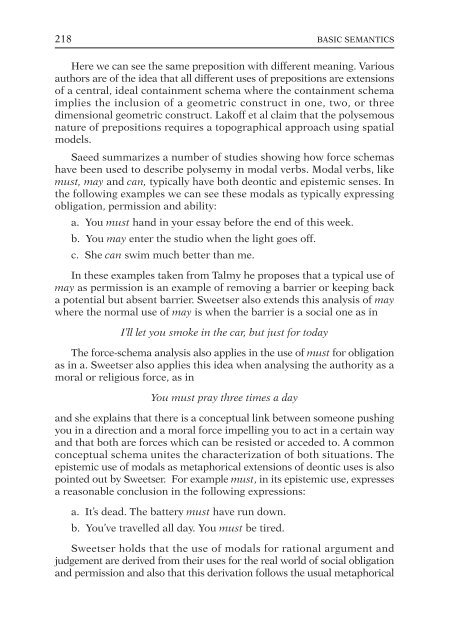Semantics
You also want an ePaper? Increase the reach of your titles
YUMPU automatically turns print PDFs into web optimized ePapers that Google loves.
218 BASIC SEMANTICS<br />
Here we can see the same preposition with different meaning. Various<br />
authors are of the idea that all different uses of prepositions are extensions<br />
of a central, ideal containment schema where the containment schema<br />
implies the inclusion of a geometric construct in one, two, or three<br />
dimensional geometric construct. Lakoff et al claim that the polysemous<br />
nature of prepositions requires a topographical approach using spatial<br />
models.<br />
Saeed summarizes a number of studies showing how force schemas<br />
have been used to describe polysemy in modal verbs. Modal verbs, like<br />
must, may and can, typically have both deontic and epistemic senses. In<br />
the following examples we can see these modals as typically expressing<br />
obligation, permission and ability:<br />
a. You must hand in your essay before the end of this week.<br />
b. You may enter the studio when the light goes off.<br />
c. She can swim much better than me.<br />
In these examples taken from Talmy he proposes that a typical use of<br />
may as permission is an example of removing a barrier or keeping back<br />
a potential but absent barrier. Sweetser also extends this analysis of may<br />
where the normal use of may is when the barrier is a social one as in<br />
I’ll let you smoke in the car, but just for today<br />
The force-schema analysis also applies in the use of must for obligation<br />
as in a. Sweetser also applies this idea when analysing the authority as a<br />
moral or religious force, as in<br />
You must pray three times a day<br />
and she explains that there is a conceptual link between someone pushing<br />
you in a direction and a moral force impelling you to act in a certain way<br />
and that both are forces which can be resisted or acceded to. A common<br />
conceptual schema unites the characterization of both situations. The<br />
epistemic use of modals as metaphorical extensions of deontic uses is also<br />
pointed out by Sweetser. For example must, in its epistemic use, expresses<br />
a reasonable conclusion in the following expressions:<br />
a. It’s dead. The battery must have run down.<br />
b. You’ve travelled all day. You must be tired.<br />
Sweetser holds that the use of modals for rational argument and<br />
judgement are derived from their uses for the real world of social obligation<br />
and permission and also that this derivation follows the usual metaphorical



